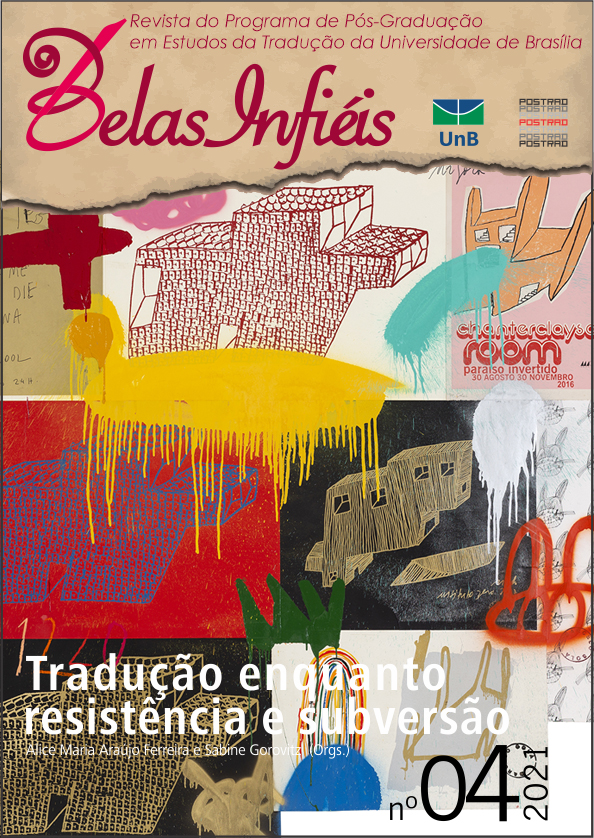Le mensonge du Migrant : Un defi ethique
DOI :
https://doi.org/10.26512/belasinfieis.v10.n4.2021.36525Mots-clés :
Politique d’accueil. Drame migratoire. Expérience exilique. Registres véridictionnels. Traumatisme. Droit d’asile. Mensonge. Psychanalyse. Littérature. Philosophie. Traductologie. Europe.Résumé
Dans l’horizon du drame migratoire en Europe, un double registre textuel accompagne l’expérience exilique : prolifération de récits de vie sur papier ou sur le web, récit du parcours à déposer devant les fonctionnaires gérant le droit d’asile. Mais le migrant ment. Le migrant ment dans le récit qu’il se fait à lui-même afin de supporter l’insupportable et ment aux autorités afin de répondre aux critères d’octroi du statut de réfugié. Ce n’est pas mentir, c’est répondre à une instance de légitimation qui se situe entre vérité et mensonge, entre deux registres véridictionnels, zone grise qu’une expérience historique telle que la Shoah nous a appris à reconnaître, qu’une disposition d’écoute telle que la psychanalyse nous a appris à respecter et qu’une théorie littéraire telle que l’autofiction nous a appris à interpréter. L’ethos exilique actuel se marque ainsi d’un secret, à respecter au point d’y fonder une éthique, une éthique exilique fondée dans la mise à distance qu’implique le secret, ce qui permettra de le comprendre à la lumière de la pensée lévinasienne. Une telle éthique ébranle les principes traditionnels d’accueil et d’hospitalité qui président encore à l’application du droit d’asile car ils supposent de part et d’autre une parole pleine et un sujet souverain.
Téléchargements
Références
NOUSS, Alexis. P. 239-251. In: CASTELAIN, Arnold (dir.). Traduction et migration : Enjeux éthiques et techniques. Nouvelle édition [en ligne]. Paris : Presses de l’Inalco, 2020.
Téléchargements
Publié-e
Comment citer
Numéro
Rubrique
Licence
(c) Tous droits réservés CC BY 2021

Cette œuvre est sous licence Creative Commons Attribution 4.0 International.
Copyright Statement
Given the public access to this journal, the texts are free to use but requires the recognition of the original authorship and initial publication in this journal to be properly stated.
The journal allows the use of works published for non-commercial purposes, including the right to submit the work to publicly accessible databases. Published contributions are the sole and exclusive responsibility of the author(s).
- When submitting papers to be evaluated by the Belas Infiéis journal, the author(s):
- Declare that the contents of the contributions are original and of their original creation, being entirely responsible for their content if there is an objection by third parties.
- Claim to be aware that they should not commit academic plagiarism.
- Declare that the manuscript has not been published, completely or partially, in Portuguese or another language. If it is a translation it should be submitted to the Translated Articles section.
- Declare that the manuscript is not being evaluated by other journals.
- Declare that the manuscript was not submitted to another journal simultaneously.
- Commit(s) to inform the journal of any kind of error or inaccuracy in their contribution (published, in evaluation or in editing) and to collaborate with the editors to make due corrections of the article (when in evaluation or editing) or erratum/retraction (after publication).
- Declare that there is no conflict of interest regarding the published work.
- Authorize its release if it is accepted for publication without any kind of monetary compensation.
- Agree to assign non-exclusive rights to publication to the magazine, remaining free to make their contribution available in other media as long as the publication of the first version in Belas Infiéis magazine is mentioned. They also authorize Belas Infiéis to assign their texts for reproduction in content indexers, virtual libraries and similar platforms.
- Maintain copyright and grant the journal the right of first publication, the work being licensed under theCreative Commons Attribution License.
- Is/Are allowed and encouraged to publish and distribute their work online after the editorial process, which may increase the impact and citation of the published work.
- Authorize the editorial team to make textual adjustments and to adapt the article to the publication rules, when necessary.



















